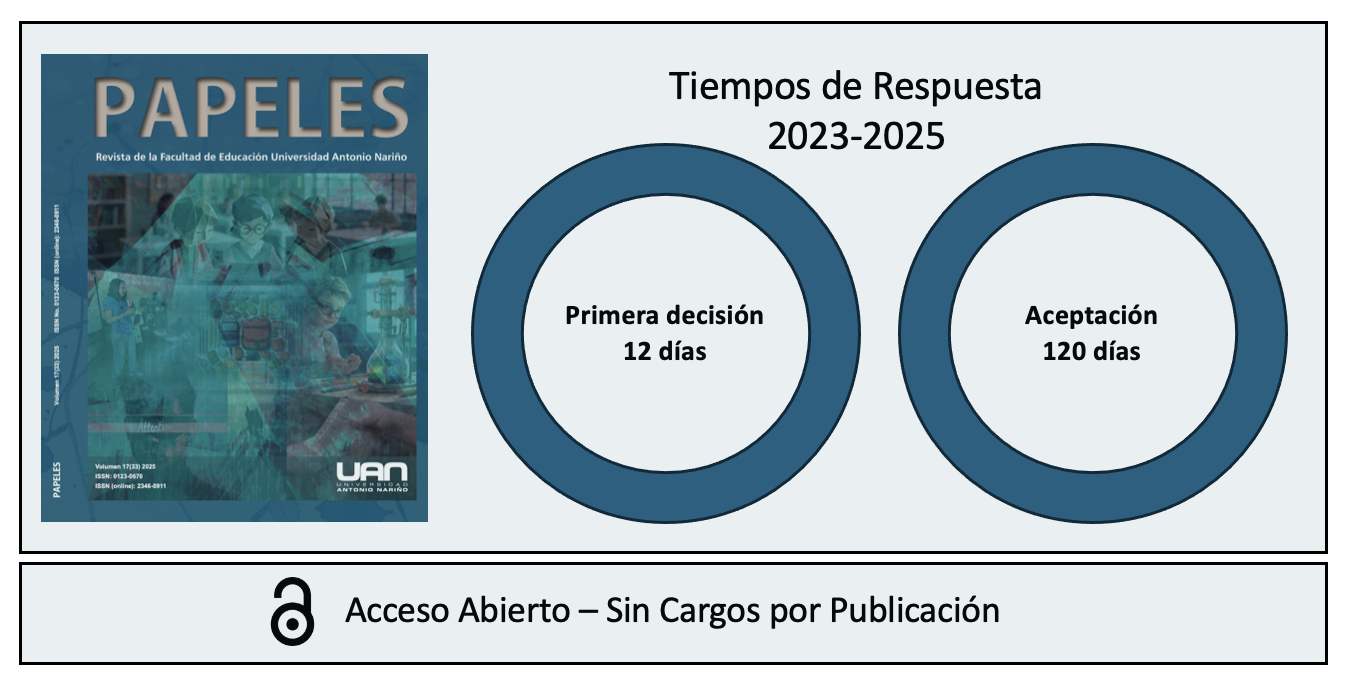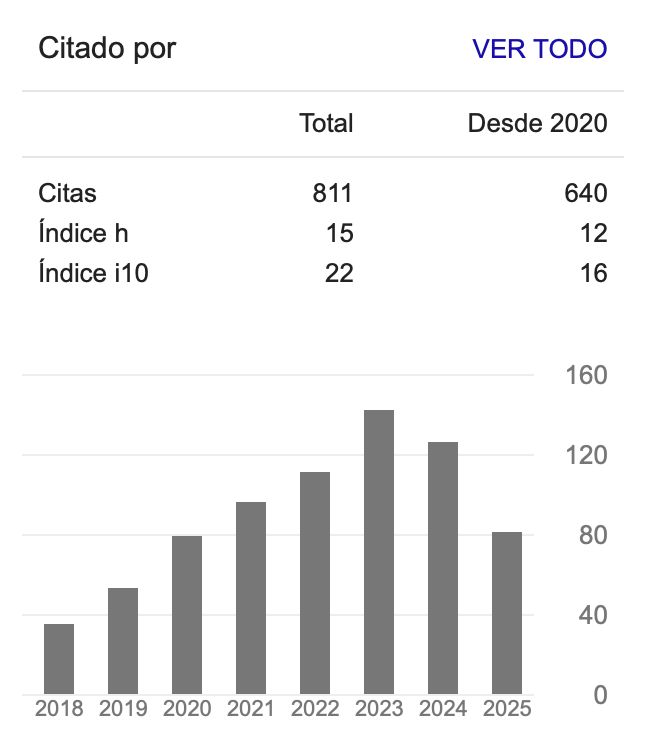El Microlearning para incentivar la Responsabilidad Social Universitaria estudiantil al insertarse en entornos laborales
DOI:
https://doi.org/10.54104/papeles.v17n34.2143Palabras clave:
Microlearning, responsabilidad social universitaria, estudiantes universitarios, inserción en entornos laborales, sostenibilidadResumen
Las instituciones universitarias tienen un rol crucial en la formación de ciudadanía socialmente responsable y deben expandir su papel más allá de la producción de conocimiento, integrando dentro de su currícula teórica y práctica la Responsabilidad Social Universitaria (RSU) y la Sostenibilidad. El objetivo de este estudio permitió analizar el impacto de un taller en materia de Responsabilidad Social y Sostenibilidad en estudiantes próximos a insertarse laboralmente. La población estuvo conformada por 18 participantes de diversas licenciaturas en áreas Económico-Administrativas de una Universidad en Querétaro, México. El taller fue impartido utilizando Microlearning como estrategia didáctica mediante la plataforma Meet con una duración de 10 horas distribuidas en 3 sesiones con contenidos sobre RSU. Se aplicó un pretest y postest para analizar el impacto del taller mediante un cuestionario de preguntas de opción y abiertas y una entrevista semiestructurada. El análisis de las respuestas obtenidas (antes y después del taller) en ambos instrumentos evidenció un incremento en la complejidad de las respuestas y un señalamiento de los participantes sobre la importancia de obtener este tipo de información antes de ingresar al campo laboral, mostrando así la urgencia de incluir la RSU utilizando estrategias didácticas como el Microlearning en los contextos universitarios.
Descargas
Citas
Barradas-Gudiño, J. (2020). Microlearning como herramienta de entrenamiento tecnológico del docente universitario. Revista Docentes 2.0, 8(2), 28-33. https://doi.org/10.37843/rted.v8i2.172
Cala, R., Díaz, L. I., Espí, N. y Tituaña, J. M. (2018). El impacto del uso de pizarras digitales interactivas (PDI) en el proceso de enseñanza aprendizaje: Un caso de estudio en la Universidad de Otavalo. Información Tecnológica, 29(5), 61-70. https://doi.org/10.4067/S0718-07642018000500061
Cedeño, P. (2023). Microlearning como estrategia para el aprendizaje masivo en educación universitaria. Impacto Científico, 18(1), 115-127. https://produccioncientificaluz.org/index.php/impacto/article/view/40289/45722
Chumaceiro Hernández, A., Hernández de Velazco, J. J. y Chirinos Noroño, E. J. (2016). Responsabilidad social universitaria, desarrollo sostenible y ciudadanía ambiental. Cuadernos de RSO, 4(1), 53-64.
Cívico-Ariza, A., Colomo-Magaña, E., Guillén-Gámez, F. D. y Rubio-Gragera, M. (2024). Píldoras formativas y competencia digital: Un recurso para la formación de futuros docentes. Edutec: Revista Electrónica de Tecnología Educativa, 88, 77-92. https://doi.org/10.21556/edutec.2024.88.3079
Corral-Verdugo, V., Tapia, C., Frías, M., Fraijo, B. y González, D. (2009). Orientación a la sostenibilidad como base para el comportamiento pro-social y pro-ecológico. Medio Ambiente y Comportamiento Humano: Revista Internacional de Psicología Ambiental, 10(3), 195-215. https://mach.webs.ull.es/PDFS/Vol10_3/Vol10_3_b.pdf
De Vita, M., Verschaffel, L. y Elen, J. (2014). Interactive whiteboards in mathematics teaching: A literature review. Education Research International, 2014(1), 401315. https://doi.org/10.1155/2014/401315
Dingler, T., Weber, D., Pielot, M., Cooper, J., Chang, C. C. y Henze, N. (2017). Language learning on-the-go: Opportune moments and design of mobile microlearning sessions. En MobileHCI '17: Proceedings of the 19th International Conference on Human-Computer Interaction with Mobile Devices and Services (pp. 1-12). https://doi.org/10.1145/3098279.3098565
Durán Alcalá, M. y Escudero Nahón, A. (2023). Microlearning en el entorno educativo. IE Revista de Investigación Educativa de la REDIECH, 14, e1763. https://doi.org/10.33010/ie_rie_rediech.v14i0.1763
Fabregat Barrrios, S. y Jodar Jurado, R. (2024). Entornos virtuales activos en el Grado de Educación Infantil: Una intervención para la mejora del rendimiento académico. Edutec: Revista Electrónica de Tecnología Educativa, 88, 107-119. https://doi.org/10.21556/edutec.2024.88.3139
Gasca-Pliego, E. y Olvera-García, J. C. (2011). Construir ciudadanía desde las universidades, responsabilidad social universitaria y desafíos ante el siglo XXI. Convergencia, 18(56), 37-58. https://www.scielo.org.mx/pdf/conver/v18n56/v18n56a2.pdf
Google Workspace for Education. (2023). Google Jamboard: Pizarra digital colaborativa [software]. https://edu.google.com/intl/ALL_mx/jamboard/
Hambleton, M. (2023). Microlearning como estrategia didáctica para la enseñanza del derecho. En L. Cavazos y A. Barbosa (coords.), Memorias del Congreso CEEAD sobre Educación Jurídica (pp. 139-146). Centro de Estudios sobre la Enseñanza y el Aprendizaje del Derecho. https://congreso.ceead.org.mx/assets/Memorias_CC2023.178a0b01.pdf
Hueso Romero, J. J., García Blazquez, E. y Gil Quintana, J. (2024). Microaprendizaje servicio a través de los sNOOC: Propuesta formativa para personas en riesgo de exclusión en México. Edutec: Revista Electrónica de Tecnología Educativa, 88, 42-61. https://doi.org/10.21556/edutec.2024.88.3101
López Pardo, I. (2016). Sobre el desarrollo sostenible y la sostenibilidad: Conceptualización y crítica. Barataria: Revista Castellano-Manchega de Ciencias Sociales, 20, 111-128. https://doi.org/10.20932/barataria.v0i20.16
Major, A. y Calandrino, T. (2018). Beyond chunking: Micro-learning secrets for effective online design. FDLA Journal, 3(1). https://nsuworks.nova.edu/cgi/viewcontent.cgi?article=1013&context=fdla-journal
Méndez Reguera, E. A. y López, M. (2021). Using a digital whiteboard for student engagement in distance education. Computers & Electrical Engineering, 93, 107268. https://doi.org/10.1016/j.compeleceng.2021.107268
Mentimeter. (2023). Mentimeter [software]. https://www.mentimeter.com/es
Morante Ríos, E. A. (2022). La responsabilidad social universitaria: Retos y perspectivas en el siglo XXI. Revista de Ciencias Sociales, 26(2), 9-21. https://revistacienciassociales.ucr.ac.cr/html/07-MORANTE177/07-MORANTE177.html
Pérez Espinoza, M. J., Espinoza Carrión, C. y Peralta Mocha, B. (2016). La responsabilidad social empresarial y su enfoque ambiental: Una visión sostenible a futuro. Revista Universidad y Sociedad, 8(3), 169-178. https://rus.ucf.edu.cu/index.php/rus/article/view/430/pdf
Ribera, B. (2018). Análisis de la concepción de estudiantes universitarios de educación superior sobre el consumo sostenible: Propuesta de implementación de un material Educativo. Universidad Autónoma de Querétaro.
Rodríguez-Farías, M. G. (2024). La responsabilidad social en el contexto universitario y la formación de nuevos profesionales. Cienciamatria, 10(18), 366-390. https://doi.org/10.35381/cm.v10i18.1306
Rubio, L. y Scofet, A. (coords.) (2017). Aprendizaje-servicio (ApS): Claves para su desarrollo en la universidad. Octaedro.
Ruiz-Barrios, E. y Diez-Martínez Day, M. E. (2021). Formación de ciudadanos ambientales mediante un curso sobre la sostenibilidad del agua utilizando TIC. Revista de Educación Ambiental y Sostenibilidad, 3(1), 1-16. https://doi.org/10.25267/Rev_educ_ambient_sostenibilidad.2021.v3.i1.1301
Salas Díaz, F., González Bello, E. O. y Estévez Nénninger, E. H. (2021). Microlearning: Innovaciones instruccionales en el escenario de la educación virtual. IE Revista de Investigación Educativa de la REDIECH, 12, e1262. https://doi.org/10.33010/ie_rie_rediech.v12i0.1262
Salinas, J. y Marín, V. I. (2014). Pasado, presente y futuro del microlearning como estrategia para el desarrollo profesional. Campus Virtuales, 3(2), 46-61. http://uajournals.com/ojs/index.php/campusvirtuales/article/view/59/58
Shaikh, I. M., Tanakinjal, G. H., Amin, H. y Noordin, K. (2025). Students’ e-learning acceptance: Empirical evidence from higher learning institutions. On the Horizon: The International Journal of Learning Futures, 33(1), 1-13. https://doi.org/10.1108/OTH-08-2022-0041
Tapia, N. (2008). Calidad académica y responsabilidad social: El aprendizaje servicio como puente entre dos culturas universitarias. En M. Martínez (ed.), Aprendizaje servicio y responsabilidad social de las universidades (pp. 27-56). Octaedro. https://diposit.ub.edu/dspace/bitstream/2445/143963/1/MARTINEZ_Aprendizaje-servicio-y-responsabilidad-social-de-las-universidades_p.pdf
Tecnológico de Monterrey. (2024). Educación digital en las universidades: Una guía de implementación integral. https://observatorio.tec.mx/wp-content/uploads/2024/03/2.-EDUCACION-DIGITAL_DOI.pdf
The Carbon Sink. (2023). [software]. https://thecarbonsink.com/
Unesco. (2015). Replantear la educación: ¿Hacia un bien común mundial? https://unesdoc.unesco.org/ark:/48223/pf0000232697
Vallaeys, F. (s. f.). Breve marco teórico de responsabilidad social universitaria. https://www.econo.unlp.edu.ar/frontend/media/86/10986/10ec2d7e617a62eba0696821196efeae.pdf
Descargas
Publicado
-
Resumen332
-
PDF133
Cómo citar
Número
Sección
Categorías
Licencia
Derechos de autor 2025 Brianda Guadalupe González Vega, Evelyn Diez-Martinez Day

Esta obra está bajo una licencia internacional Creative Commons Atribución-SinDerivadas 4.0.







 Portal de Ciencia Abierta
Portal de Ciencia Abierta